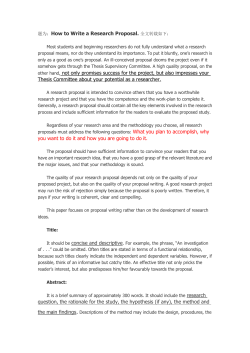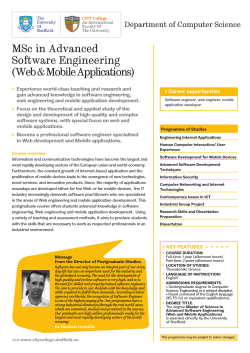
syllabus - University of Pennsylvania
Ed 995.069 Dissertation seminar Fall 2014 Ethnographic Research Methods in Language & Education 1 SYLLABUS Prof. Nancy H. Hornberger Education 334 / tel. 8-7957 Class/individual meetings: Tuesdays 1-4 Education 124 Course aims A seminar course for dissertators. Emphasis is on methods of data collection, data analysis, and writing, primarily but not exclusively within the paradigm of ethnographic research in language and education. Under the supervision of the instructor, students will present their own work to the seminar for discussion, critique, and advice. On occasion, students may also present brief summaries of articles or books from the reading list that they deem particularly relevant or useful for the ongoing discussion. Course texts There is no assigned course text, but there are many suggested references, posted on the course website. A useful general reference is the 10-volume Springer Encyclopedia of Language and Education, edited by N. H. Hornberger (2008), available in print and electronic form from Van Pelt Library. Course outline 9/2 Introduction and scheduling 9/9 no meeting 9/16 Rachel & Sofia 9/23 Geeta & Miranda 9/30 Mary 10/7 no meeting 10/14 Adrianne & Sofia 10/21 Emma & Rachel 10/28 no meeting 11/4 Geeta 11/11 Miranda & Sofia 11/18 Emma & Mary 11/25 no meeting 12/2 Adrianne 12/9 no meeting Upcoming presenters send their material or post it to the course website NO LATER THAN 48 hours before their class presentation, sooner if it’s a longish piece. This will usually be no more than 3-5 pages of data or interview transcript or 20-30 pages of written text. Presenters should include cover letter with instructions and framing questions for readers, to guide class discussion. Ed 995.069 Dissertation seminar Fall 2014 Ethnographic Research Methods in Language & Education 2 Guidelines on dissertation committee composition Minimum of three members: chair, member, reader. Chair must be a member of the Graduate Group in Education and of the standing faculty. Minimum of two must be members of the Education Graduate Group. My suggestion: try to include one member from outside your program specialization faculty. External members (from outside Penn) must be approved via a special form from Student Records along with the c.v. of the external member. The student bears responsibility for transportation expenses for the external member. In general, your chair plays a very active role in advising you, the second member plays a minor role in advising, and the reader reads final draft only. There may be variations on this pattern, particularly if your second member provides a complementary area of expertise important to your topic or method of research. You may have fourth and fifth members (or more); you may also have 'outside readers' at your own initiative (and depending on their willingness), who are not officially part of the committee. http://www.gse.upenn.edu/phd on dissertation (excerpted below): Students must consult with their advisor for assistance in selecting a group of at least three people with earned doctorates to serve as the dissertation committee. Committee members should be selected on the basis of their relationship to the dissertation content. Upon advancement to candidacy, each student has a Dissertation Committee consisting of at least three faculty members (including at least two members of the Education Graduate Group). A list of Education Graduate Group members is available here. The third member may be a scholar external to the University of Pennsylvania with a doctoral degree, including a qualified individual who does not hold faculty rank at a college or university. To include an external member, students must have approval from the committee chair and the Assistant Dean for Academic & Student Affairs. One person is designated the chair. The chair of a Ph.D. dissertation committee must be both a member of the standing faculty and a member of the Graduate Group in Education. The dissertation committee chair becomes the official faculty advisor. Although all members of a student’s dissertation committee are expected to be physically present at the oral proposal and final defense hearings, in extenuating circumstances one member, or a minority of the committee, may be physically absent as long as the absent member(s) participate(s) in the oral proposal and final defense hearings. Ed 995.069 Dissertation seminar Fall 2014 Ethnographic Research Methods in Language & Education 3 Essential elements of the dissertation proposal statement of problem / definition/delimitation of topic / statement of purpose (personal motivation / interest in topic) conceptual framework / theoretical approach / literature review research questions and design methodology, setting, participants, methods of data collection & data analysis scholarly significance and implications / expected contribution to knowledge research timeline (optional) dissertation chapter outline In writing the proposal and, eventually, the dissertation, use a standard style. APA style is the most usual in our field: see the Publication Manual of the American Psychological Association. Be consistent in your reference citation, giving specific page numbers (e.g. Hymes 1974: 101). Always include a complete list of references with any piece of writing you give your dissertation chair or committee. Essential elements of the dissertation There is no one and only format for a dissertation; this is particularly true in qualitative and ethnographic research. However, there are some essential elements, which can be boiled down to three: conceptual framework, findings, and implications. These elements fall out naturally when you consider that a dissertation is intended to show that (1) you are steeped in a body of theory and research in a particular academic area; (2) you have done some original research in that area; and (3) you can show how your research findings connect back to that body of theory and research. However you write up your dissertation, it should include all three of these elements and should also make clear which is which. A possible chapter by chapter organization is as follows: 1) Introduction (includes brief statement of purpose and research questions) 2) Conceptual framework (theoretical and research literature in your area) 3) Research setting, participants, methods of data collection and data analysis 4) Findings 5) Findings 6) Findings 7) Conclusions and implications References Appendices See also the section on Dissertations in the GSE Student Handbook for further information on guidelines and procedures. Ed 995.069 Dissertation seminar Fall 2014 Ethnographic Research Methods in Language & Education 4 Process for working with your chair and committee There are three basic principles for the most efficient process in working with your dissertation chair and committee in writing your dissertation proposal and later your dissertation: (1) Work with your chair first to produce a complete, approved draft BEFORE you give it to your other committee members. This allows for you to work with a consistent set of feedback and is also respectful of the time and effort of your committee members. (2) Allow sufficient time for your chair (and later your committee members) to read and comment on your work. It may be helpful to establish a pattern of giving your chair a set of chapters (or sections of your proposal) while you continue working on other chapters (or sections). Sufficient turnaround time usually means a minimum of 4 weeks. As a rule, faculty are not available for dissertation advising or reading during winter break (20 December - 15 January) nor during June, July, and August. (3) Allow sufficient time for yourself to revise and incorporate the feedback from your chair and committee members. This is also usually a minimum of 4 weeks for any substantial piece of writing, such as a proposal or a dissertation chapter(s). Sample timeline for submitting final draft and graduating The best approach is to project backwards from your hoped-for graduation date, using various GSE and university deadlines and draft review and revision turnaround times to construct a feasible schedule. Here is a sample timeline for graduation in May 2015 (but also check dates with relevant offices). 18 May 2015 mid-April 2015 Graduation! Submit final manuscript to Graduate School of Arts and Sciences, by appointment early April 2015 Submit final manuscript to Education Graduate Group Chair, by appointment mid-March 2015 Submit final manuscript to Dissertation Chair early March 2015 Hold final oral defense mid-December 2014 Submit full draft to Dissertation Committee, with Chair approval 30 November 2014 Submit full revised draft to Dissertation Chair 31 October 2014 Chair returns draft with comments 1 September 2014 Submit full draft to Dissertation Chair AY 2013-2014 Submit individual chapters to chair for comment and subsequent revision Ed 995.069 Dissertation seminar Fall 2014 Ethnographic Research Methods in Language & Education 5 SELECTED REFERENCES ON ETHNOGRAPHIC RESEARCH IN LANGUAGE AND EDUCATION Lists are organized rather arbitrarily in the following categories and posted on the course website: Ethnographic research – methods and tools Participant observation and fieldnotes Interviewing and transcription Data analysis and interpretation Videotaping and microanalysis (Critical) discourse analysis Narrative inquiry/ oral history Ethnographic narrative and writing up qualitative research Qualitative data analysis tools on the computer Genres of ethnographic research (in relation to language and education) Linguistic ethnography and linguistic anthropology of education Critical ethnography Collaborative and participatory (action) research Teacher research / practitioner research Overviews and how-to’s Encyclopedias and handbooks on language, literacy, and education Ethnographic/qualitative research methodology: Handbooks, overviews, how-to's Ethnographic / qualitative research methods in education Ethnographic / qualitative research methods in language and education Epistemological issues & controversies Culture (as what ethnographers study) Reflexivity and emergence Qualitative-quantitative debates / mixed methods research Scientifically-based research Validity, reliability, typicality, etc. Research ethics and IRB review
© Copyright 2025









